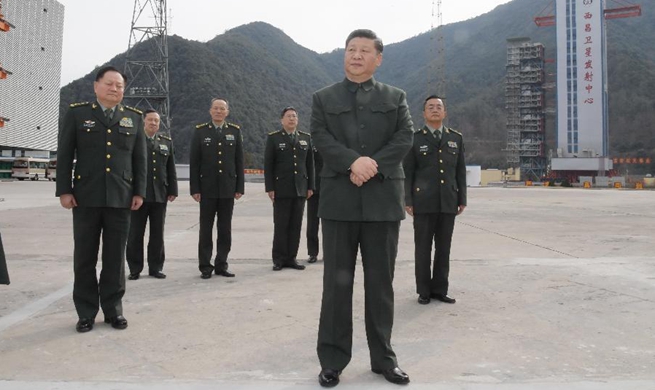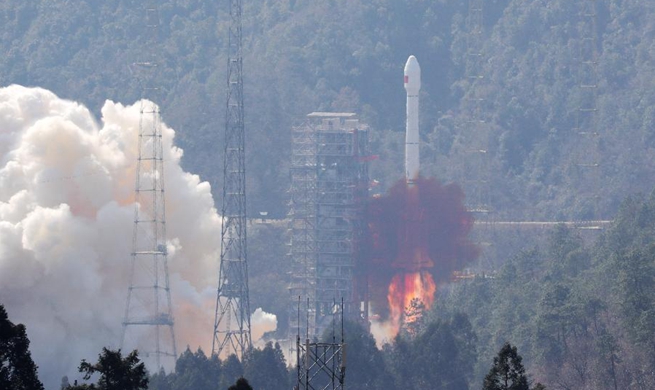BERLIN, Feb. 12 (Xinhua) -- German Social Democratic Party (SPD) parliamentary faction leader Andrea Nahles will take over the party leadership from Martin Schulz sooner than expected, German media reported on Monday.
According to the reports, Nahles could already unofficially assume the function on Tuesday before being formally inaugurated at an upcoming party conference in March. The change is a hope by the party's leadership committee to contain the bitter infighting which has continued despite Schulz's resignation from the role as SPD leader, as well as his more recent surrender of the prospective post as foreign minister in a new "grand coalition".
Manuela Schwesig, senior SPD politician and governor of Mecklenburg-Vorpommern, welcomed the news while appearing on the public broadcaster ARD.
"I very much support Andrea Nahles taking over the leadership of the SPD swiftly," Schwesig said.
Similarly, Johannes Kahrs, leader of the SPD's conservative faction, told Rheinische Post that a quick change of hands was needed.
"If the party leadership committee will nominate Andrea Nahles as leader (in March) anyway, it is sensible to already make her the provisional leader," Kahrs argued.
SPD executives have voiced fears that ongoing personnel debates are a distraction to the party membership ahead of a crucial referendum on whether or not to join Chancellor Angela Merkel's (CDU) fourth governing cabinet. The public eruption of a rivalry between Schulz and acting foreign minister Sigmar Gabriel (SPD) in particular has overshadowed significant concessions secured by the SPD in coalition negotiations with the Christian Democratic Union (CDU) and the Christian Social Union (CSU).
As a consequence, opponents of another "grand coalition" have only been strengthened in their resolve to derail the laborious process of government formation during its very last stage at the SPD vote on March 4. Many among the more than 400,000 members of the party are wary that another full-term as "junior partner" to the CDU and CSU could lead to the electoral marginalization of social democracy in Germany.
Furthermore, even senior SPD figures have expressed disappointment that the decision to transfer the leadership from Schulz to Nahles was made in a small elite party circles rather than having been debated broadly.
SPD secretary general Lars Klingbeil has since advocated for a change in party statutes which would require a binding membership vote on the election of any leader to resolve this issue in the future.
"We have decided at the party conference in December that we would examine the possibility of such a primary election," Klingbeil told Redaktionsnetzwerk Deutschland (RND), adding that the party should accept the new mechanism "in the long run."
Klingbeil's proposal was seconded by acting labor and families minister Katarina Barley (SPD) and the SPD's regional branch in Saxony-Anhalt. By contrast, the designated finance minister Olaf Scholz (SPD) rejected calls for change.
"We have a good and proven process, which is to determine leaders at party conferences," Scholz said. While he agreed the SPD was in need of renewal, Scholz said there were other issues which were more urgent, such as how to increase its voter share above 30 percent again.
In the meanwhile, SPD vice-president Ralf Stegner lashed out against a "lack of discipline" amongst SPD politicians and urged them to resolve their differences. Speaking on the public broadcaster ZDF, Stegner said the dramatic retreat of Schulz from all of his party offices was a "last warning" for the SPD to get its house in order.
Stegner's comments were interpreted by some German papers as a thinly-veiled stab against Gabriel. The acting foreign minister had launched a searing personal attack on the SPD leadership for "breaking its word" after it was initially announced that Schulz would take over its job.

















